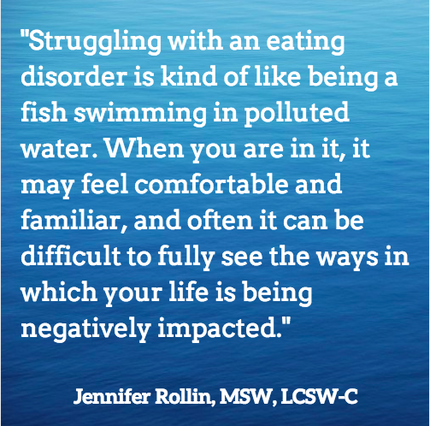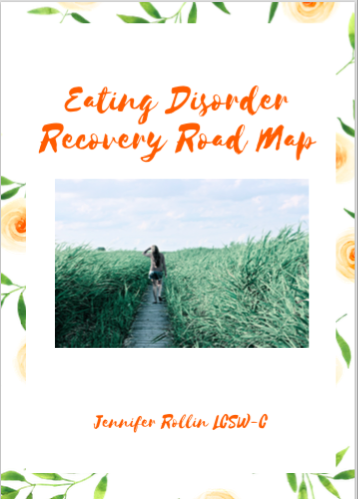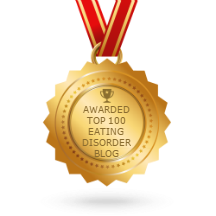- Home
- About
-
Services
- Therapy
-
Eating Disorder Trainings
>
- Clinical Approaches To Treating Body Image Issues
- Clinical Approaches To Treating Bulimia & Binge Eating Disorder
- Finding Freedom From Binge Eating
- Finding Freedom From Anorexia
- Supporting A Loved One With An Eating Disorder
- Eating Disorder Recovery Road Map
- Healing From Body Hate And Practicing Self-Compassion
- Common Questions
- Blog
- Press
- Contact
|
"I don’t know why I’m so obsessed with my weight...I feel like I’m just shallow.” Full stop. As an eating disorder therapist, I can’t tell you the number of times that I have heard this kind of statement from a client in recovery. Often people with eating disorders struggle with feelings of shame around their thoughts or behaviors. This is unfortunately, frequently reinforced and perpetuated by our culture. A few celebrities (I’m looking at you Meghan Trainor and Amy Schumer) have made jokes that they didn’t have the “willpower” to have an eating disorder. You Aren’t Shallow Here’s the thing. An eating disorder isn’t just “a diet gone to far,” “willpower or lack there of,” or someone who is simply vain or shallow. Eating disorders are the deadliest mental illness. They are caused by a combination of genetic, biological, temperamental, and environmental factors. Symptoms often manifest with a preoccupation around food and weight. However, that’s generally the tip of the iceberg. Eating disorder treatment is about helping people to develop a healthy relationship to food and their bodies. It also entails helping clients learn how to process and cope with intense emotions, work through any potential underlying trauma, and develop a more compassionate way of relating to themselves. Additionally, the fact that my clients are so upset with the idea that “they are shallow” is a clear indicator that they are not, because the eating disorder fixation on weight and body often goes completely against their true values. It’s a Half-Life Struggling with an eating disorder often feels like living a half-life. Even if on the surface you are accomplishing things, there is often part of you that is numbed out, unhappy, or disconnected. Many people also initially struggle with constant thoughts about food, weight, and their body. Struggling with an eating disorder is kind of like being a fish swimming in polluted water. When you are in it, it may feel comfortable and familiar, and often it can be difficult to fully see the ways in which your life is being negatively impacted. Eating disorders aren’t a choice. Many of my clients initially blame themselves for developing an eating disorder. But having an eating disorder is NOT your fault. It was completely not your choice to get sick, however working on recovery is a choice. It’s a decision that you may have to make over and over again, until you are recovered and it’s simply a way of being. Jennifer Rollin, MSW, LCSW-C: is an eating disorder therapist in private practice in Rockville, Maryland. Jennifer specializes in helping teens and adults struggling with anorexia, binge eating disorder, and bulimia, and body image issues. Jennifer provides eating disorder therapy in Rockville, MD, easily accessible to individuals in Potomac, North Potomac, Bethesda, Olney, Germantown, and Washington D.C. Connect with Jennifer through her website: www.jenniferrollin.com Jennifer also offers online trainings for professionals on eating disorders and body image issues.
4 Comments
I believe that many great accomplishments start with a solid plan. For instance, before I launched my private therapy practice-I came up with a business plan. I attribute much of my current success, to the plan that I created. I also have made monthly goal lists for a long time and the interesting thing is that looking back on my old lists-many of the dreams I had listed-actually came to fruition. From writing for The Huffington Post, to speaking at The BEDA/NEDA conference, to having a thriving therapy practice helping people with eating disorders. The Importance of Creating a Recovery Plan The thing is, when we get very clear about what we want, as well as potential obstacles, and gain insight into our current situation, incredible things can happen. The reality is that often the things that we focus on expand. This can work in either helpful or unhelpful ways. For instance, let’s say that you have the core belief “I am such a failure.” You likely will start to see “evidence” of your belief everywhere. The reason behind this phenomenon is that we have a reticular activating system within the neocortex of our brain. This system helps us to filter important information and impacts what we focus on. It heightens our awareness of certain things. This applies to coming up with a specific plan, as it heightens our awareness of opportunities, ideas, and resources, that can aid up in achieving our goals. For instance, coming up with a plan for your recovery from an eating disorder, can help you to attune to aspects of your environment, that could help you in your recovery. Creating a plan gives you solid goals, action steps, and mindfulness of your current state. I believe that these aspects are so critical when it comes to recovering form your eating disorder I have the privilege to be able to help clients to recover from eating disorders, and they inspire me with their strength everyday. However, I wanted to be able to reach more people. There was this strong voice inside me, which said that I needed to create a resource for people to set them up on the path to recovering from their eating disorder. That’s why I created, “The Eating Disorder Recovery Road Map," a 15 page workbook plus guided audio, which enables you to create your own personalized recovery plan. I think of myself as someone with pretty high energy (shoutout to ample carbs, fat, and protein!), but creating this resource was unlike anything I’ve done before. I woke up, had this idea, and felt driven to put it out into the world. Somehow amidst, a full day of seeing clients-I used my breaks and time before/after work, to create this resource-that I’m incredibly proud of. Struggling with constant thoughts about food and your body is exhausting. Grab your copy of "The Eating Disorder Recovery Road Map" and take another step closer to the freedom that you deserve. Jennifer Rollin, MSW, LCSW-C: is an eating disorder therapist in private practice in Rockville, Maryland. Jennifer specializes in helping teens and adults struggling with anorexia, binge eating disorder, and bulimia, and body image issues. Jennifer provides eating disorder therapy in Rockville, MD, easily accessible to individuals in Potomac, North Potomac, Bethesda, Olney, Germantown, and Washington D.C. Connect with Jennifer through her website: www.jenniferrollin.com Jennifer also offers online trainings for professionals on eating disorders and body image issues. Welcome to my new blog series, "Recovery Stories," where I will share interviews with people who identify as strongly in recovery or fully recovered. I hope that this inspires hope for those who are still struggling with an eating disorder. Jennifer: Tell me a little bit about your struggle with an eating disorder (please avoid numbers of graphic descriptions of behaviors, so as not to trigger my readers): Pepper: The development of the eating disorder was a perfect storm. I was genetically and environmentally predisposed, I had a family history of mental illness and addiction. On my Dad’s side of the family I had aunts, half-sisters and cousins with eating disorders and on my Mom’s side other mental illnesses and addictions. I had a personality temperament that made me anxious, perfectionistic, persistent and emotionally sensitive. I developed mononucleosis when I was 12 years old and I was sick for many months. I also began puberty at this age and did not like the body parts I acquired as I received unwanted attention from a male cousin and as a result I rejected my body. I began not feeling good enough in all areas of my life, I hated myself, I felt depressed and emotionally raw. My peers would make comments about my body and scrutinize what I ate. In an attempt to be healthy, I started eating less and discovered that it numbed my emotions. I suffered in silence for five years, until I hit a breaking point and I wrote a letter to my doctor explaining my mental anguish and body distortions. This led to an eating disorder diagnosis when I was 17 years old. A few months after I was diagnosed my Dad was diagnosed with cancer and I spiraled out of control. I went to five treatment centers in four years and became fully recovered in 2010. Jennifer: What do you think was the function of your eating disorder in your life? Pepper: As a teenager I was confused about my sense of identity, I was afraid to be myself, I didn’t know who that was and I was afraid people wouldn’t like me. I was a highly sensitive, I took rejections from boys I liked, personally and thought there was something wrong with me. The eating disorder helped me numb the inadequacy and raw emotions that I felt. Jennifer: Was there a turning point for you, where you really started to embrace the idea of recovery? Pepper: My Dad was dying from cancer and he was doing everything he possibly could do to live. Although, I never chose to have an eating disorder just like my Dad never chose to have cancer, I could make a choice to be an active participant in my recovery. I decided to throw my hands up in the air and commit 100% to letting go of the eating disorder forever. Jennifer: What were some of your motivations in terms of pushing yourself in recovery? Pepper: I knew that there was a better life out there for me, I was unwilling to settle that I would have an eating disorder for the rest of my life like my family members. I wanted to have a career, get married and have kids and I knew that those things would not be enjoyable or possible if I kept the eating disorder. Jennifer: What was the most helpful for you in terms of your recovery (i.e. specific skills, tools, treatment etc)? Pepper: Journaling – writing down my thoughts and feelings was freeing, it was a way to get the eating disorder thoughts out of my head and to quiet the eating disorder voice. Collaging – I would create vision boards of goals and how I wanted my life to be, looking back many of these vision boards came true. Affirmations – I would write affirmations such as "my worth is not my weight," and “I am enough” and place them all over my bedroom walls and on my mirror, I looked at them every day, they helped rewire my brain. Putting full faith in others and treatment team – I knew I couldn’t see or think clearly and I needed to trust others to see for me until one day in the future when I could see clearly again. Jennifer: If you could go back and talk to your younger self who was really struggling, what would you want to say to her? You are not alone. Just because you can’t see the light at the end of the tunnel and recovery feels impossible, if you keep fighting and never give up, one day you will be fully recovered. All of the hard work you are putting into recovery will be worth it. Pepper: How is your life in recovery (or recovered) different from your life in an eating disorder? What would you say are some of the benefits of being recovered? I have been fully recovered for 8 years meaning I have not had an Ed thought or used a behavior to cope with life for 8 years. I can see myself clearly, having an eating disorder is a thing of the past and nothing could trigger me back into it. I know that I am a worthy person who is good enough. I have a solid sense of my identity and who I am. People’s opinions of me do not influence the thoughts I have about myself. I never thought is a million years that I could ever recover from an eating disorder. Let alone work in the field and now help and inspire people that they too can be fully recovered. I do not regret having had an eating disorder, if anything I am grateful because I have had incredible opportunities to help others, I know that this is what I was meant to do, this is my life purpose. Jennifer: What are some of your favorite recovery resources? (i.e. books, articles, podcasts, etc). Pepper: “Life without Ed” and “Goodbye Ed, Hello Me” by Jenni Schaefer – These books were instrumental in my recovery. Stay posted for the next installation of the "Recovery Stories" series. Feel free to comment some of your favorite recovery mantras or affirmations below. Jennifer Rollin, MSW, LCSW-C: is an eating disorder therapist in private practice in Rockville, Maryland. Jennifer specializes in helping teens and adults struggling with anorexia, binge eating disorder, and bulimia, and body image issues. Jennifer provides eating disorder therapy in Rockville, MD, easily accessible to individuals in Potomac, North Potomac, Bethesda, Olney, Germantown, and Washington D.C. Connect with Jennifer through her website: www.jenniferrollin.com Jennifer also offers online trainings for professionals on eating disorders and body image issues. Brené Brown a prominent shame researcher talks about how she believes that guilt and shame are fundamentally different. Boiled down to the simplest explanation, Brown explains that guilt is,"I did something bad," whereas shame is “I am bad.” "I define shame as the intensely painful feeling or experience of believing that we are flawed and therefore unworthy of love and belonging – something we’ve experienced, done, or failed to do, makes us unworthy of connection," Brown says. As an eating disorder therapist in private practice, I have noticed that many of my clients initially struggle with feelings of shame around struggling with an eating disorder, or surrounding their eating disorder behaviors. This is perfectly understandable given that there are so many myths about eating disorders swirling around. So just to dispel a few myths:
Eating disorders and Shame When my clients come into my office and judge themselves for having a setback on the path to recovery-or even simply for struggling with an eating disorder symptom-I try to point it out in that moment. A couple times I have said, “how many clients do you think that I would help if I said, (and then I will repeat what the clients just said about their behavior ie "It’s so stupid that you had anxiety about eating that," or "You’re such a failure because you used an eating disorder behavior." The client generally laughs or looks surprised and says “Yea that wouldn't help people.” Then, I will say (with compassion) “so what makes you think that is a helpful thing to say to yourself?” Shaming yourself is never going to be helpful when you are in recovery from an eating disorder (or in general). In fact, shame often perpetuates the cycle. For instance, if a client binges and purges and then shames themselves for the behavior-they may then restrict food the next day-leading them to be far more likely to binge and purge again. Feelings of shame surrounding their eating disorder, may cause the individual to turn to their eating disorder behaviors as a way to cope. Many of my clients have mentioned that they didn’t even realize how much they were shaming themselves, until I pointed it out. Self-Compassion I work to help clients move towards viewing and treating themselves through a more self-compassionate lense Instead of saying, "What the hell is wrong with me, that I’m so anxious about eating this food?" I would have them practice telling themselves, "I’m recovery from an eating disorder. It’s perfectly understandable that I’m feeling really afraid, and I still need to work to challenge myself by gradually facing the foods I am afraid of. Brown shares, "Shame needs three things to grow exponentially in our lives: secrecy, silence, and judgment.” It's important to acknowledge that your eating disorder has served a function in your life. It may have even helped you to get through some difficult or traumatic circumstances, and it also is no longer serving you. Through acknowledging this, we can start to uncover the function of your eating disorder and work towards finding new coping strategies that are more in alignment with your true values. If you are struggling with feelings of shame in your recovery journey, it’s so important to practice being open and honest with people that you trust. If you find that members of your treatment team are shaming you-I’d advise letting them know, and if it persists to find a new team. With self-compassion and through the use of tools and skills-you can work to find freedom from your eating disorder. I feel so privileged to be able to work almost exclusively with people with eating disorders. They are some of the most intelligent, kind, resilient, and strong people, that I know. Jennifer Rollin, MSW, LCSW-C: is an eating disorder therapist in private practice in Rockville, Maryland. Jennifer specializes in helping teens and adults struggling with anorexia, binge eating disorder, and bulimia, and body image issues. Jennifer provides eating disorder therapy in Rockville, MD, easily accessible to individuals in Potomac, North Potomac, Bethesda, Olney, Germantown, and Washington D.C. Connect with Jennifer through her website: www.jenniferrollin.com “It seems like I’m actually experiencing my feelings, now that I’m no longer bingeing and purging my emotions,” my client in recovery from bulimia shared.
Eating disorders are believed to be caused by a combination of factors including, genetic, temperamental, and environmental influences. However, one thing that almost all of my clients with eating disorders have in common is difficulty in expressing, processing, and coping with their emotions. Emotional Avoidance and Eating Disorders Emotional avoidance, is described as actions that are intended to prevent an emotional response from occurring, such as fear, anger or sadness. People struggling with eating disorders often turn to their eating disorder behaviors in an unconscious effort to try to help themselves to “feel better” and to cope with difficult emotions or life circumstances. For instance, for many people struggling with anorexia, their response when it comes to coping with feelings of anxiety, sadness, or loneliness, is to restrict their food. This may give them a false sense of “control” and specialness. For individuals with bulimia, bingeing and purging provides them a momentary feeling of comfort, “control,” or relief. For people struggling with binge eating, eating often feels like “an escape,” comforting, calming, or a way to numb out. The reality is that eating disorder behaviors often provide short-term relief or satisfaction, and long-term feelings of increased depression, loneliness, and misery. Let Yourself Feel Eating disorder treatment involves a variety of tools and strategies for helping clients to reclaim their lives. However, one important element is helping them to learn how to identify, process, and cope with their emotions in ways that align with their life values. I often say to clients that trying to suppress our emotions, is kind of like trying to hold a beach ball under water. It takes a lot of effort and eventually the beach ball will fly up above the water with force. As a culture, we are often not taught to express our emotions. It’s important to share with clients that their eating disorder behaviors are often coping strategies that they are using for “self-soothing.” These behaviors may have helped them to get through some difficult and traumatic times, however they are also no longer serving them. With treatment and support, people with eating disorders can learn how to heal their relationships with themselves, food, and their bodies. They can also learn how to express and process their emotions, without the constant strain of trying to suppress or run from their feelings. Part of living a meaningful life is being able to experience all of one’s emotions, both pleasant and unpleasant. One of the great privileges of doing this work is being able to see the light return into someone's eyes, for them to be exploring their true passions and interests, for their brain space to be no longer ruled with thoughts about food and their body. Full recovery and living according to your true values, is completely possible. Jennifer Rollin, MSW, LCSW-C: is an eating disorder therapist in private practice in Rockville, Maryland. Jennifer specializes in helping teens and adults struggling with anorexia, binge eating disorder, and bulimia, and body image issues. Jennifer provides eating disorder therapy in Rockville, MD, easily accessible to individuals in Potomac, North Potomac, Bethesda, Olney, Germantown, and Washington D.C. Connect with Jennifer through her website: www.jenniferrollin.com To The Person Who Is Questioning Whether They Are "Sick Enough" For Eating Disorder Treatment1/7/2018 As an eating disorder therapist, one common thing that I hear all of the time, is a person’s belief that they aren’t “sick enough” to have an eating disorder or to need eating disorder treatment. Eating disorders can often be “competitive illnesses.” For instance, your eating disorder may cause you to compare yourself to others who are struggling and will then tell you that you “aren’t sick enough.” Your eating disorder will say this in an effort to keep you trapped and under it’s control. Often for your eating disorder there is no “sick enough.” I’ve heard from people who were near death and still didn’t believe that they were ill. Additionally, some people with restrictive eating disorders struggle with something called “anosognosia” which is a brain-based lack of awareness, where essentially the individual is unable to see that they are ill. This is why it’s so important for concerned individuals to push their loved ones to seek treatment, even if the person declares that they are “fine.” Even if you don’t suffer from anosognosia, if you try to convince yourself that you are “fine” you do not have to take the scary steps towards recovery. So it makes complete sense as to why you might want to believe that “everything is ok,” even if it’s not. Unfortunately, there is also a lot of stigma and misinformation about what someone with an eating disorder “looks like,” or the signs that someone might be struggling. Individuals who are suffering might internalize some of these messages. So today, I want to make a few things clear. · Even if you are considered to be “normal weight” or “overweight” (according to BMI charts, which are hugely problematic and political, but I reference it here to make a point). · Even if you think that you are “too big” to have an eating disorder. · Even if you’ve never had a feeding tube. · Even if your eating disorder never landed you in the hospital. · Even if you “still eat meals.” · Even if you never had medical complications from your eating disorder. · Even if your labs appear “normal.” · Even if you have some days that feel easier than other days. · Even if you think that others “have it worse than you.” · Even if family and friends do not seem concerned about you. If you are struggling with a preoccupation with food and weight-you are “sick enough” and you absolutely deserve to seek treatment and help. Eating Disorder Myth-Busting. Eating disorders are mental illnesses, and we cannot tell how much someone is suffering on the basis of their physical appearance. Additionally, life-threatening eating disorders can impact people of all weights, body types, ages, ethnicities, genders, cultures, and socioeconomic statuses. They do not discriminate. Seek Help I don’t even think I could count the number of times that I’ve worked with clients who say, “but I can’t possibly have an eating disorder because I’m not underweight,” or “It can’t really be that serious because I look normal.” As a therapist, I work almost exclusively with people struggling with eating disorders and they come in all different body shapes and sizes. You cannot tell whether someone is struggling on the basis of their weight or appearance. If you have a voice in your head that convinces you to restrict your food, over-exercise, binge, purge, or engage in any other eating disorder behaviors, you are “sick enough” and you deserve to get help and support. Full recovery is possible. Yes, for you too. Jennifer Rollin, MSW, LCSW-C: is an eating disorder therapist in private practice in Rockville, Maryland. Jennifer specializes in helping teens and adults struggling with anorexia, binge eating disorder, and bulimia, and body image issues. Jennifer provides eating disorder therapy in Rockville, MD, easily accessible to individuals in Potomac, North Potomac, Bethesda, Olney, Germantown, and Washington D.C. Connect with Jennifer through her website: www.jenniferrollin.com “I’m so bad for eating these cookies.” “The Holidays are coming, so I’d better spend more time at the gym.” The pervasive messaging around the holidays is one of “sinful indulgences.” Many people struggle with feelings of anxiety or guilt over the abundance of food around the holidays and perhaps eating in a way that is different from their “norm.” As a therapist who specializes in helping people to make peace with food and their bodies, the following are a few quick reminders if you are struggling with food guilt around the holidays. 1. Remind yourself that food and morality do not go together. You aren’t “bad” for eating pie (unless you stole it!) or “good” for eating green beans. This idea of “good” and “bad” foods keeps people stuck in an unhealthy relationship to food. For example, let’s say that I think cookies are “bad” and I should avoid them. What might happen if the cookie looks appealing and I end up having one? Some people will then proceed to binge on or overeat more cookies, with the thought being “Screw it. I’ve already messed up today, so might as well eat more cookies.” Others, may simply sit with feelings of guilt-which could cause them to restrict or “try to compensate” later. You can overdose on kale (yes, this is actually a thing) in the same way that you can overdose on cake. All foods can fit into a healthy diet, and no foods are “good” or “bad.” 2. Recognize that food guilt takes you away from connecting to people. Being fixated on your body and food over the holidays, can take you away from the moment and your ability to connect with people. One big aspect of health and longevity is social connections and relationships. When you stress about what you are eating, this can cause you to isolate yourself from others or to not be fully present with them. Do you really want to reflect on the holidays as a time that you spent focused on your body or food? Work to shift your focus to the real importance of the holiday, and to being able to enjoy the present moment. 3. Notice the unhelpful food thoughts, and then practice some coping statements. It’s important to start out by simply noticing any judgmental or unhelpful thoughts that you are having around food. Pretend that you are an anthropologist of your own inner experiences, and start to get curious about the things that you are telling yourself. We have thousands of thoughts per day, but not everything that we tell ourselves is true. Once you are able to notice your unhelpful thoughts, practice responding to yourself with some coping statements. Coping Statements · All foods can fit into a healthy diet. · I deserve to nourish myself with food that I enjoy. · Food isn’t only good for the body, but also for the soul. · Mental health is an important part of health and being anxious around food, is not mentally healthy. · Food isn’t just fuel, it’s also about pleasure, connection, and joy. · One meal or snack will not have an impact on my health or weight. · When my body digests food, glucose looks the same-it doesn’t matter if it came from quinoa or cake. · My weight is the least interesting thing about me. · I am not more valuable if I take up less space. Enjoy the Holiday, Guilt-Free If you are struggling with this, it’s so important to reach out for help. No one should have to go through this alone and you can recover from disordered eating and eating disorders. Ultimately, you deserve to enjoy the holiday guilt-free, because guilt-free foods=all foods. Jennifer Rollin, MSW, LCSW-C: is an eating disorder therapist in private practice in Rockville, Maryland. Jennifer specializes in helping teens and adults struggling with anorexia, binge eating disorder, and bulimia, and body image issues. Jennifer provides eating disorder therapy in Rockville, MD, easily accessible to individuals in Potomac, North Potomac, Bethesda, Olney, Germantown, and Washington D.C. Connect with Jennifer through her website: www.jenniferrollin.com Purchase Jennifer’s webinar on healing from body hate and practicing self-compassion. In my work as a therapist working with people struggling with eating disorders, some will describe their eating disorder as feeling like “a friend.” To those who don’t struggle with eating disorders, this might seem confusing. However, often to the person who is struggling, their eating disorder may feel like a source of “companionship,” “comfort,” “something that makes me feel special,” and “that is always there for me.” Your eating disorder has served some purpose for you, or you wouldn’t engage in the behaviors. However, it’s important to note that eating disorders often provide short-term feelings of “comfort,” and “anxiety-relief,” with long-term feelings of isolation, depression, and misery. Your Eating Disorder Is Like a Toxic Friendship The reality is that your eating disorder is like an incredibly toxic friendship. Your eating disorder threatens that if you decide to leave, your life will be in shambles. Your eating disorder tells you that you will be unhappy without it. Your eating disorder promises you comfort, connection, and specialness-and it may give you those feelings in the short-term. However, in the long-term, it only serves to make you more isolated, lonely, disconnected, and isolated from the people that you care about. An eating disorder often starts to become your primary relationship and your other relationships may start to suffer. Eating disorders may promise to make you feel “special” and “unique.” However, the reality is that the deeper you are into an eating disorder, the more you become a carbon copy of everyone else who is struggling with an eating disorder. An eating disorder hijacks your true sense of self and replaces it with an illness. I posted something the other day on Instagram, which helps to explain why eating disorders are like toxic (or even abusive) friendships, it said: Your enjoyment of family dinners Your sense of humor Your ability to feel happy Your friendships Your passions Your fertility Your health You strong bones Your shiny hair Your confidence Your freedom Your life What will your eating disorder take from you if you continue to stay sick? Eating disorders are not a choice. But you can choose to take the first step towards recovery, today. If You Are Afraid To Let Go Of Your Eating Disorder If you are afraid of letting go of your eating disorder and starting to take steps towards recovery, I’d ask you to make a list of what your life could look like 5 years from now if you stay sick, vs. 5 years from now if you recovered. The reality is that you can always go back to your eating disorder. But what if you tried something different this time? You know how to have an eating disorder, but what if you gave recovery a try? You will not regret it. Have you ever been in a toxic friendship, and when the friendship finally ended you felt free? This is ultimately how you will feel when you recover. Your life will no longer be dictated and controlled by this eating disorder yelling in your head. You will be able to explore your true passions, build and strengthen relationships, and feel a sense of freedom and peace. Full recovery from an eating disorder is possible! Jennifer Rollin, MSW, LCSW-C: is an eating disorder therapist in private practice in Rockville, Maryland. Jennifer specializes in helping teens and adults struggling with anorexia, binge eating disorder, and bulimia, and body image issues. Jennifer provides eating disorder therapy in Rockville, MD, easily accessible to individuals in Potomac, North Potomac, Bethesda, Olney, Germantown, and Washington D.C. Connect with Jennifer through her website: www.jenniferrollin.com It’s so common that for people struggling with eating disorders there is often a sense of ambivalence. Often, part of them wants to hold onto the eating disorder, and another part of them desperately wants to be free from it. In terms of building your motivation to want to get help, or to continue to work on recovery, it can be important to look at what your eating disorder is keeping you from. Eating disorders steal people’s lives. Like an abusive partner, they promise to give you comfort and companionship. However, the reality is that they only provide short-term feelings of “comfort,” or “anxiety-relief,” with long-term feelings of misery and increased anxiety. As an eating disorder therapist in private practice, I work to help people to start to separate out their “eating disorder self,” from their “healthy self.” Together, we can empower the “healthy self” and find new ways of coping, rather than turning to eating disorder behaviors. Eating Disorder Values Vs. True Values One exercise to start getting clear on your “eating disorder” values vs. your “healthy self” values is to make a quick list of the things that your “eating disorder values.” For instance, your eating disorder may value things like, “thinness,” “having a sense of control,” or “numbing out emotions.” Next, it’s important to look at your true values. For instance, one way to start to look at this would be to ask yourself, “What do I want to be remembered for?” or “At the end of my life, I will feel that I have lived according to my values if..” Then, come up with a list of the things that are actually meaningful to you. For instance, maybe you value having meaningful relationships, family, and your career. What Is Your Eating Disorder Keeping You From? Lastly, I want you to get very clear on ways in which your eating disorder or body-shame might be keeping you from your actual values. For instance, often when someone is struggling with an eating disorder-it becomes their primary relationship and their other relationships start to suffer. Eating disorders also promise that they make you “unique and special,” however they actually turn you into a carbon copy of others who are struggling with the same illness. The reality is that they take away the traits and qualities that actually make you special, and replace them with an illness. You have so much more to offer the world than your disordered thoughts and behaviors. One way to examine this further is to make a list of what your life could look like 5 years from now if you are recovered from your eating disorder, vs. 5 years from now if you stay trapped in this illness. Self-Compassion It’s so important to be kind to yourself. It’s not your fault that you are struggling with an eating disorder. Eating disorders are mental illnesses, not something that anyone would choose to struggle with. No one would choose to feel intense anxiety at the thought of eating at a restaurant, to binge eat until they feel sick and ashamed, to be caught in the exhausting cycle of bingeing and purging, to suffer from health complications. It’s not your fault and it’s not a choice, however you can make the brave choice to work on recovery from this. Ultimately, looking at your “life values” can help you to recognize that doing the work to heal your relationship to food and your body, will have a big pay-off. I don’t know about you, but at the end of my life-I don’t think that people will be reminiscing and sharing that they remember me fondly for my size ___ jeans or for my appearance. What I want to be remembered for is the kindness that I extended to others, the way that I pursue my passions, my relationships, and how I worked to advocate and treat those struggling with eating disorders and body shame. If your eating disorder is keeping you from your true values-I’d encourage you to take the first step towards seeking help. Seeking help when you are struggling is a sign of true strength, not weakness. You deserve a meaningful and joyful life. Jennifer Rollin, MSW, LCSW-C: is an eating disorder therapist in private practice in Rockville, Maryland. Jennifer specializes in helping teens and adults struggling with anorexia, binge eating disorder, and bulimia, and body image issues. Jennifer provides eating disorder therapy in Rockville, MD, easily accessible to individuals in Potomac, North Potomac, Bethesda, Olney, Germantown, Gaithersburg, and Washington D.C. Connect with Jennifer through her website: www.jenniferrollin.com For many people the jump from ‘body hatred’ to ‘body love’ feels overwhelming and impossible. There’s a lot of talk in the media about focusing on ‘body love.’ For those who are struggling with loving their body, it may feel like they are failing. However, when I work with clients, I talk to them about redefining positive body image. The way that I define positive body image, is not spending so much time thinking about the appearance of your body because you are busy living your amazing life. Even if you look in the mirror and love what you see, the reality is that our bodies will change as we age. Our bodies are not slabs of marble and they are not meant to stay the same. Thus, putting your self worth into your external appearance is a recipe for discontent. However, one thing that can be helpful on the journey to creating a more positive body image (i.e. going from body-hate to a less body-focused life) is thinking about a sense of gratitude for body-function. Body Gratitude Practicing body-gratitude is all about shifting focus from the way that your body looks, to thinking about all of the incredible things that your body does for you everyday. It’s about learning to see that our bodies truly are meant to be our home, not a barometer of our worth or indicative of our value. There’s a great quote that I love from Glennon Doyle Melton which says, “Your body is not your masterpiece — your life is. It is suggested to us a million times a day that our BODIES are PROJECTS. They aren’t. Our lives are. Our spirituality is. Our relationships are. Our work is. Stop spending all day obsessing, cursing, perfecting your body like it’s all you’ve got to offer the world. Your body is not your art, it’s your paintbrush. Whether your paintbrush is a tall paintbrush or a thin paintbrush or a stocky paintbrush or a scratched up paintbrush is completely irrelevant. What is relevant is that YOU HAVE A PAINTBRUSH which can be used to transfer your insides onto the canvas of your life — where others can see it and be inspired and comforted by it.” Self-Compassion If you are struggling with a focus on the appearance of your body, it’s so important to be kind to yourself. You are definitely not alone in this and it’s not your fault. However, you can work to take steps to start to improve your body-image. Additionally, it’s important to note that when thinking about body-gratitude there are many people who struggle with chronic illness, health conditions, and physical disabilities. While, it may seem difficult to practice body gratitude. It’s helpful to acknowledge that it’s understandable that are struggling with this, and then work to shift focus for the abilities that you do have and for the things that your body does for you. If you are struggling with negative body image and it’s impacting your life, it’s so important to seek help from a professional. Seeking help when you are suffering is a sign of true strength, not weakness. After all, life is too short to spend your time hating your body and letting the way that you feel about your appearance, keep you from enjoying your incredible life. An Exercise: Here’s a quick exercise that you can do:
You can also check out the link below to listen to my free 13 minute, body-gratitude meditation. Jennifer Rollin, MSW, LCSW-C: is an eating disorder therapist in private practice in Rockville, Maryland. Jennifer specializes in helping teens and adults struggling with anorexia, binge eating disorder, and bulimia, and body image issues. Jennifer provides eating disorder therapy in Rockville, MD, easily accessible to individuals in Potomac, North Potomac, Bethesda, Olney, Germantown, and Washington D.C. Connect with Jennifer through her website: www.jenniferrollin.com |
About MeI'm an eating disorder therapist in private practice in Rockville, MD. Archives
September 2019
|












 RSS Feed
RSS Feed
